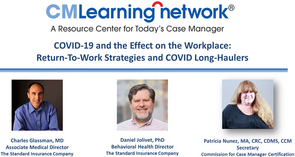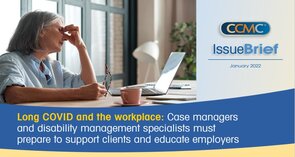Posted on 02/11/2022 - 3:13 PM
CCMC Presents Long COVID Resources
Webinar: COVID-19 and the Effect on the Workplace: Return-To-Work Strategies and COVID Long-Haulers
As long-haul COVID seems to present a constantly changing set of physical and emotional impacts how does the disability management specialist or case manager maintain an appropriate level of connection with their clients in order to keep current with their changing conditions and explore additional remedies and resources? Speakers will address these and other issues.
Blog: Coming to terms with Long COVID in the workplace: Disability management specialists can lead the way
It’s been an intense two years for disability management specialists and case managers. On top of your regular responsibilities—which probably expanded during the pandemic—you’ve probably been called on to help develop COVID-related policies and interpret new regulations. You’ve seen the locus—and definition—of “the workplace” change. It’s a lot to keep up with. Now, another challenge has emerged: long COVID, officially termed “post-acute sequelae of COVID-19 (PASC).”
Only recently have we begun to grasp the impact of long COVID on the workplace. Despite knowing about COVID-19 and its symptoms, most health care professionals don’t completely understand what has come to be called “long COVID.” Case managers and disability management specialists need to learn as much as they can, says Patricia Nunez, MA, CRC, CDMS, CCM, secretary, Commission for Case Manager Certification. “As many as 30% of those who get COVID-19 have lingering symptoms, some debilitating.” The medical term for long COVID illness is post-acute sequelae of COVID-19 (PASC). PASC includes persistent or new symptoms that develop at least four to eight weeks after the initial infection with COVID-19. For some people, these symptoms persist for a year or more. Estimates vary widely: About 10% to 30% of COVID-19 survivors develop PASC.



